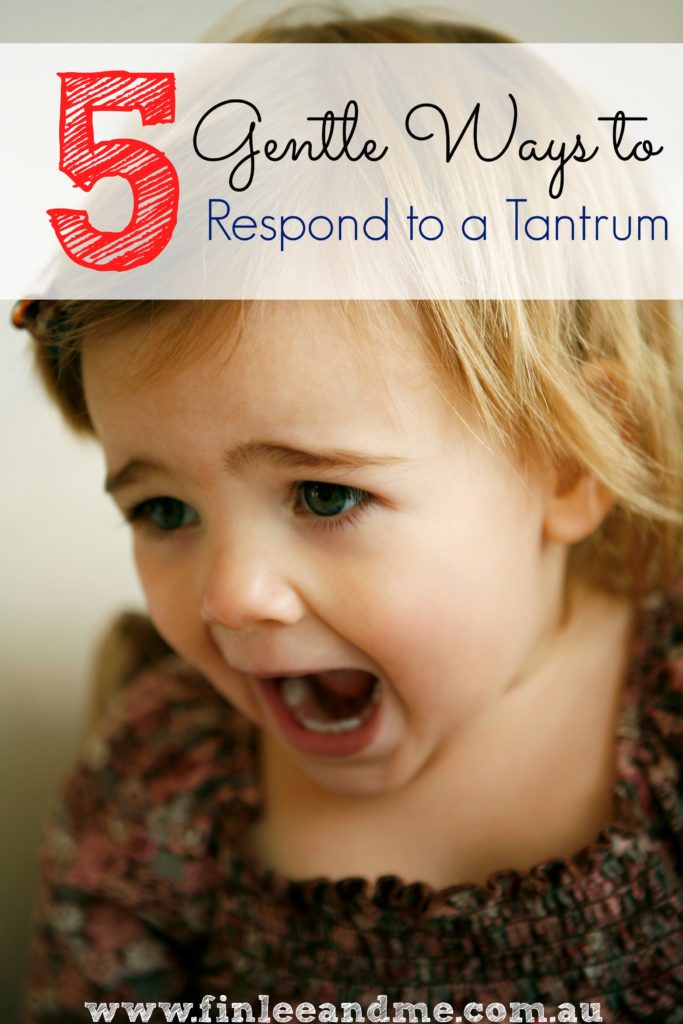In January my beautiful Chloe Glen-Ella turned 3 years old. Her smile, laughter and kindness radiates through our home on a daily basis. However, with many 2 year olds and 3 year olds, I also experience daily tantrums/frustrations and up until the last 6 months I typically would respond to a tantrum horribly.
Last night as I was putting Chloe to bed she had a full blown tantrum. As I held her and tried to calm her, she lost her cool and hit me smack in the face. I could feel my blood boiling, my face turning all shades of pink/red, my vocal cords getting ready to explode with a loud yell, but instead I laid her down gently and simply sat beside her. You see, these last few months I’ve been working on keeping myself calm and collective in order to respond to a tantrum in a more controlled way. I remind myself that clearly Chloe’s upset for a reason and I need to support her. And guess what? You’d be surprised at how things have improved, so I thought I’d share with you my 5 gentle ways to respond to a tantrum.
Tantrums
I think it’s important to be mindful that tantrums are extremely common in toddlers and preschoolers. As I’m sure many of you know, tantrums come in all different shapes and sizes depending on the age, temperament of a child, their environment and so many other factors. As parents, we simply don’t understand why it matters so much that the sandwich was cut in squares with the crusts on vs love hearts with no crusts? However, for our two/three year olds, their tantrum is justified, it’s important and they want to be heard.
Another important element that most of us forget is that kids between the ages of 2 and 3 are constantly having surges of brain development. For 2-3 year olds, this is the time when emotional development starts to appear. It’s a time where we’ll start to see increased independence and also personal preferences (hence why the heart shape sandwiches, with no crusts are super important). However, even though there’s so much emotional development happening, children still don’t quite have the cognitive capacity to understand how the world works, they still may have difficulty verbally communicating and with all of these factors we end up with increased tantrums in kids.
5 Gentle Ways to Respond to a Tantrum
I’d like to give my disclosure statement before I give you my 5 gentle ways to respond to a tantrum. As a parent, we try our best every day to do the “right” thing by remaining calm, remaining patient and remaining in control however, it doesn’t always work like that. We’re human. We’re going to still lose it some days, we’re going to make mistakes, we’re going to fail. But that’s ok. We’re all human and we’re all just trying to do our absolute best for our families. So be gentle on yourself, tomorrows a new day.
My 5 gentle ways to respond to a tantrum include:
- Be present, be in the moment – as parents so many times we think about walking away, closing the door and taking a minute. But remember what I said earlier, kids don’t necessarily think the was we do because they don’t have the cognitive capacity. So try being present and being in the moment. Remain in the room. By remaining in the room, you’re providing a safety net a sense of security, but equally you’re showing them that you’re supporting them in a time that is hard for them.
- Offer a hug – a simple hug or holding of their hand can sometimes start to deescalate the tantrum. The power of human touch can be the very calming element they need to start to calm down. Some children may not want to be touched and it’s important to respect that, but still stay close by so they feel nurtured and supported.
- Listen – sometimes our children just need to feel heard. Sometimes we cut them off or minimise their need by saying “just wait a minute” while we continue doing what we feel is more important. Giving our children the opportunity to be heard while they have their tantrum can help to make the child feel understood and therefore, can help to deescalate the situation.
- Offer food – this might sound like a simple suggestion, but I can’t even being to count how many times my kids have had a tantrum due to being hungry. Either I got caught up with running errands and forgot to bring snacks, or I pushed lunch back an hour what ever it is, by offering food the tantrum can pretty much be stopped. Again, the kids weren’t able to communicate that it was food they wanted because they were hungry. So the next time a tantrum happens, offer them something to eat and see what happens.
- Say I love you – in the heat of a tantrum it can be easy for our own emotions to be running high and at times, we may say things like “just stop crying, why are you crying, you’re driving me crazy. ” However, if you can replace these words with I love you, or I love you because you make me smile etc or you can use any of positive statements from our blog 50 Positive Things to Say to Your Child; I promise both short term and long term gains for your relationship with your children because what you’re saying is even in the darkest of moments you still love them.
Once the Tantrum Passes
I think it’s imperative that once the tantrum passes and both child and parent are calm, that you take the opportunity to talk about things on the level that they can understand and process. Talk with them on how in the future they could do things differently. Role play with them what this looks like. For example, “when you’re tummy starts to feel hungry could you tell Mommy that you’d like some apple etc.” By opening up the doors of communication this will allow both parties to feel heard and will also build your relationship with your children for a happier and healthier future.
As I mentioned earlier, some days you’ll be calm and respond to a tantrum in an appropriate way and other days you’re going to lose your shit because it’s the 188227 tantrum you’ve dealt with a tantrum this week. Remember you’re doing the best you can. From one mother to another, you’re doing a great job.
Love,
Angela from Finlee and Me
Angela is an author, entrepreneur, blogger, mental health clinician and most importantly a mother. She explores various topics related to parenting/children on her blog and also in her three books: 30 Days, 30 Ways for Mothers to Take Care of Themselves, 30 Days, 30 Ways for Connecting with Your Child and Healthy Snack Ideas for Kids. Connect with her on Facebook, Instagram and her website Finlee and Me.







Really great advice in this post. Thanks Angela.
Thanks so much for your kind words Kate. Wishing you a great day, Angela xx
I love these ideas for dealing with a tantrum in a more gentle way. It’s been a long time since I’ve dealt with major tantrums (my youngest is now 6) but with my two elder kids on the autism spectrum, we face regular meltdowns. There are many similarities in dealing with both as there is always another cause behind the behaviour. Staying calm and trying to concentrate on the cause rather than the behaviour itself, works best in the long run.
Hi Kirsty – hope you’re having a great day.I’m a mental health clinician of 14 years and work with many different kids and it’s so true there is always another cause behind the behaviour. Wishing you a great day. Angela xx
Thanks for your advice. My daughter is 4 and has huge tantrums this will certainly help.
Cassandra – you’re very welcome. Wishing you a great day and a wonderful holiday season. Angela xx